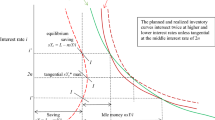Abstract
Socialist objectives can be achieved in a market context with the rule of law if market socialism were to take the form of competitive worker-owned and self-managed enterprises, supplemented by universally available welfare redistributions, which could include a basic income, universal capital grants, or education and health insurance vouchers.
Similar content being viewed by others
References
Ackerman, B., & Alstott, A. (1999). The stakeholder society. New Haven: Yale University Press.
Bowles, S., & Gintis, H. (1993). The revenge of Homo economicus: Contested exchange and the revival of political economy. The Journal of Economic Perspectives, 7(1), 83–102.
Bowles, S., & Gintis, H. (1998). Recasting egalitarianism. London: Verso.
Ellerman, D. (1992). Property and contract in economics. Oxford: Basil Blackwell.
Hamowy, R. (1961). Hayek’s concept of freedom: A critique. New Individualist Review, 1(1), 28–31.
Hayek, F. (1960). The constitution of liberty. Chicago: University of Chicago Press.
Hayek, F. (1961). Freedom and coercion: Some comments on Mr. Hamowy’s criticism. New Individualist Review, 1(2), 28–30.
Hayek, F. (1978). Adam Smith’s message in today’s language. New studies in philosophy, politics, economics and the history of ideas. Chicago: University of Chicago Press.
Horwitz, S. (2007). “Leftists for Hayek.” Reason, July, 65–69.
Murray, C. (2006). In our hands: A plan to replace the welfare state. Washington, D.C.: AEI.
Nussbaum, M. (2008). ‘Mutilated and deformed’: Adam Smith on the material basis of human dignity. The cosmopolitian tradition. New Haven: Yale University Press (forthcoming).
Roemer, J. (1994). A future for socialism. Cambridge: Harvard University Press.
Samuels, W. (2002). The rule of law and the capture and use of government in a world of inequality. Economics, governance and law. Cheltenham: Edward Elgar.
Smith, A. (1981). An Inquiry into the Nature and Causes of the Wealth of Nations, vol II. Indianapolis: Liberty Fund.
Storr, V. (2007). Review of Theodore Burczak’s Socialism after Hayek. Review of Austrian Economics, 20(4), 313–316.
van der Veen, R., & Van Parijs, P. (2006). A capitalist road to communism. Basic Income Studies, 1, 1–23 (originally published in Theory and Society, 15(5) (1986), 635–55).
Wolff, R. (2007). Why communism? Rethinking Marxism, 19(3), 322–336.
Author information
Authors and Affiliations
Corresponding author
Rights and permissions
About this article
Cite this article
Burczak, T. Why Austrian socialism?. Rev Austrian Econ 22, 297–300 (2009). https://doi.org/10.1007/s11138-008-0059-z
Published:
Issue Date:
DOI: https://doi.org/10.1007/s11138-008-0059-z




